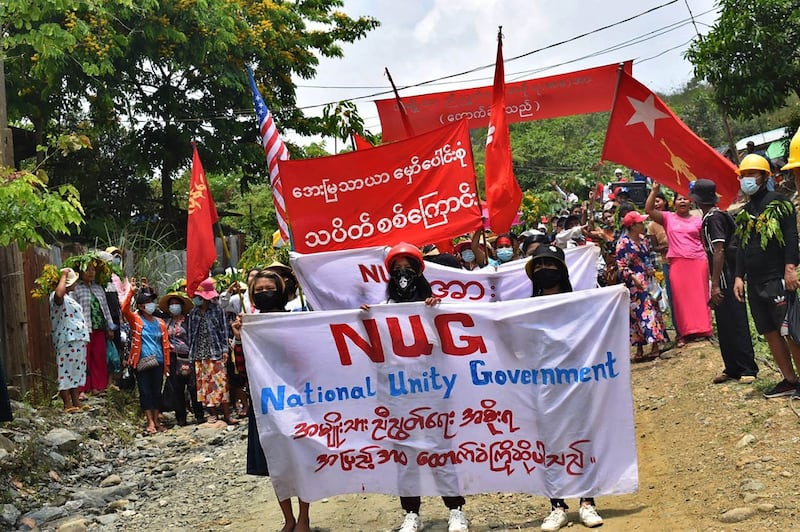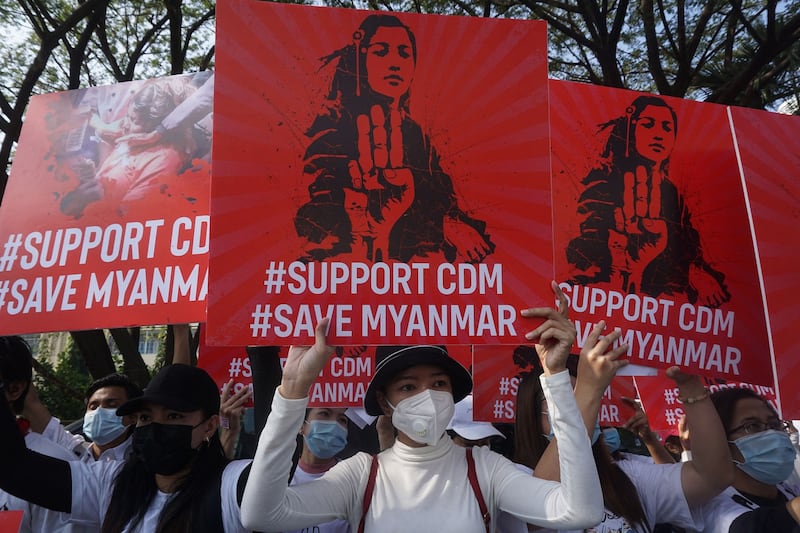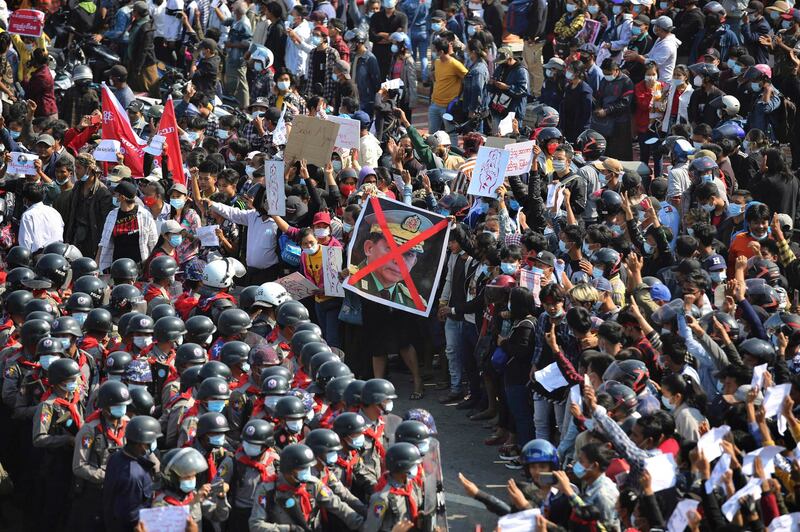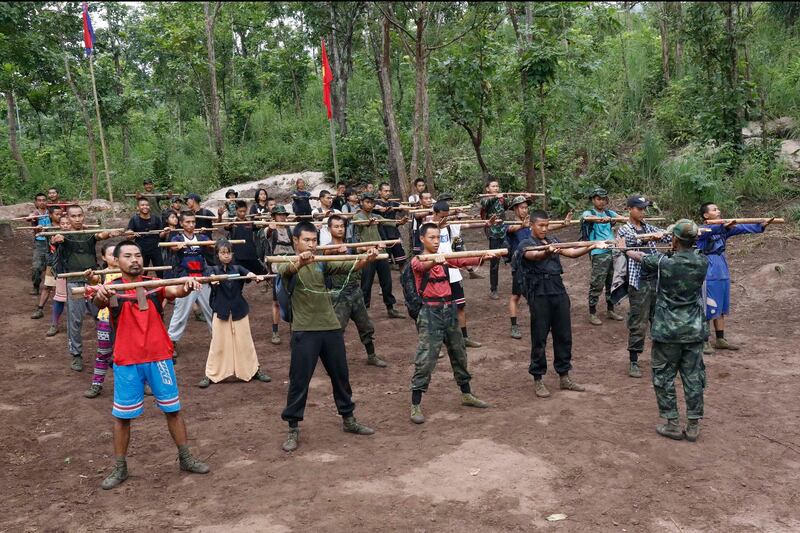More than two years after it was founded as a shadow opposition to the military junta, Myanmar’s National Unity Government continues to enjoy high rates of legitimacy. The broader Civil Disobedience Movement remains robust, while the military is reviled. So what explains the military’s cohesion and what are the implications of the low numbers of defections?
On April 2, the NUG's Ministry of Defense issued their latest appeal to attract military and police defectors. Defections are a key part of the NUG's military strategy, and so it's worth delving into the document.
The NUG claimed that by the end of February, 12,327 members of the security forces, 3,236 soldiers and 9,091 policemen had joined the program.

These numbers are higher than what People’s Embrace, an NGO that encourages defections and offers support to defectors, had previously recorded. The NUG’s Ministry of Defense didn’t provide any supporting evidence.
Moreover, 8,000 people had defected in 2021; the rate dropped sharply in 2022. And when defections do occur, it tends to be individuals, not groups, let alone entire units. There have also been few senior officers who have defected.
While anecdotal evidence suggests that desertions are up, there is no way to quantify them.
Deterring defections
Stemming mass defections has arguably been the Tatmadaw's most important military victory to date.
They have done so through keeping close tabs on soldiers, monitoring their social media posts, made easier by subsidizing or forcing them to use SIM cards sold by MyTel, the telecoms firm that is a joint venture between the Myanmar and Vietnamese militaries.

Soldiers and their families live in military cantonments and work in military-owned companies. They have all their savings in one of two military-owned banks, Myawaddy and Innwa, which allows the leadership to monitor large withdrawals.
There are some financial costs to defecting as well. All soldiers are forced to buy a minimum two-year life insurance policy, with an up-front cost of K500,000 ($238), a princely sum for an enlisted man, and a monthly deduction of K8,400 ($4).
And there are reports that the insurance provider, Aung Myint Moh Min Insurance Co., which is owned by Min Aung Hlaing’s son and has had the contract since 2015, have not been paying benefits out of a shortage of cash, unit-level corruption, and/or fear of acknowledging the high rate of casualties.
At the same time, all soldiers have a compulsory monthly deduction from their salary to buy shares in the military-owned conglomerate Myanma Economic Holdings Ltd. The rate is determined by their rank. All military personnel are supposed to get an annual dividend, yet none have been paid since the coup.
Foregoing these investments alone is not enough of a disincentive, but coupled with the others, it’s an added deterrent.
And of course there is just old-fashioned indoctrination. The military has always been able to segregate soldiers from the population and brainwash them with a sense of superiority and responsibility that only they can hold the fractious country together.

Given the use of war crimes as a deliberate strategy, including torture and killing of POWs, intentional targeting of civilians, arson destruction of more than 65,000 homes, beheadings and desecrations, many soldiers may feel they're too culpable to ever be allowed to defect without punishment.
In normal times, desertion would merit a three year prison sentence. But with fighting on multiple fronts and depleted manpower, the military has been executing would be defectors to set an example.
A newly passed law on firearms criminalizes the selling or transfer of state-owned weapons or ammunition punishable with stiff sentences and making it, in some cases, a capital offense, another deterrent for would-be defectors.
Insufficient support
There has been insufficient funding for the defections program. For the NUG, it was a conundrum. How could they fund defectors while their own supporters were living in squalor and being asked to support the anti-junta struggle?
The NUG has provided limited funding, in particular, for those who defect with their weapons. In April, for example, three soldiers and four policemen defected with their weapons and ammunition, receiving $3,500 each. That won’t go far.
The international community deserves much of the blame. Unwilling to support armed resistance, funding defections is the epitome of non-lethal assistance. And yet most donors view it as lethal assistance. It would be lawful under the U.S. BURMA Act, passed as part of the 2023 National Defense Authorization Act.
Defections are key to the NUG strategy. While the NUG and their PDFs and affiliated ethnic resistance organizations have outperformed, they are not going to defeat the junta militarily, despite the regime’s admission that it has lost control in 132 (42 percent) of the 330 townships and declared martial law in 47 townships (14 percent).
The NUG claims that some 30,000 junta forces have been killed and over 11,000 wounded to date. Even if unconfirmed, it’s clear that the military has suffered high casualty rates amongst its 70,000 combat soldiers and its units are undermanned and operating at unsustainable tempos.
Morale, we know from defectors, is very low. A recent BBC report discussed the demoralization felt by rank and file from public animus. Battlefield losses, limited equipment and supplies, have further eroded support.
The military has had trouble recruiting, even to its two elite schools, the Defense Service Academy and the Defense Services Medical Academy, despite the anemic economy.

The NUG’s strategy is to hollow out the military to the point that it can no longer deploy and sustain its troops across multiple battlefronts.
Not only do the defections deplete the military, but they are essential in arming the NUG’s forces. Demand has driven up black market prices for automatic weapons by three- to four-fold. While most Ethnic Resistance Organizations are able to manufacture much of their own arms and ammunition, demand right now is surging and exhausting production capabilities.
The NUG’s Ministry of Defense warned that the People’s Embrace program was not open-ended. While this is probably for financial reasons, they clearly need to encourage a new round of defections, before this year’s dry season offensive, especially as the military gave itself a 51 percent budget increase to $2.7 billion for the 2023 fiscal year.
The NUG must make a decision on the scope of a general amnesty, and message it clearly and directly to the troops. And the international community must have the foresight to support it.
But the opposition forces also have to get their own house in order. Recent videos have shown members of the NUG’s people’s defense forces mistreating captured pro-junta Pyu Saw Htwee militiamen. That conduct is not just unlawful, but un-strategic, and will reinforce military and pro-junta militia cohesion.
